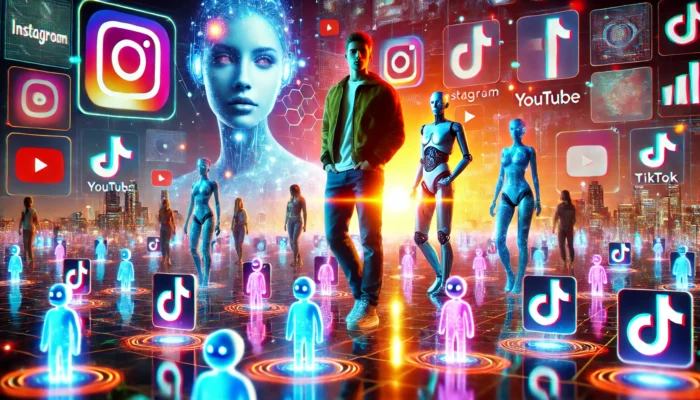The Rise of AI Social Media Influencers
The Rise of AI Social Media Influencers: Transforming the Digital Landscape
In the ever-evolving world of social media, a new breed of influencers is making waves—AI social media influencers. These computer-generated personas are designed to interact with users, create content, and even endorse products, all while blurring the lines between reality and virtuality. As we move through 2024, AI influencers are becoming an integral part of digital marketing strategies. This blog will explore the rise of AI social media influencers, their impact on the industry, and key statistics that highlight their growing influence.
1. What Are AI Social Media Influencers?
AI social media influencers are virtual characters created using artificial intelligence and computer graphics. Unlike traditional influencers, they are not real people but are designed to mimic human behavior and appearance. These influencers can engage with audiences, create posts, and even respond to comments, making them highly interactive and engaging.
Some of the most popular AI influencers include Lil Miquela, a virtual model and musician with millions of followers on Instagram, and Shudu, the world’s first digital supermodel. These AI personas are crafted with intricate details, from their physical appearance to their personalities, making them almost indistinguishable from real humans.
2. The Appeal of AI Influencers
The appeal of AI influencers lies in their versatility and control. Brands can customize these virtual personas to align perfectly with their image and values. Unlike human influencers, AI influencers do not have personal issues, controversies, or scheduling conflicts, making them a reliable and consistent marketing tool.
Moreover, AI influencers can be programmed to target specific demographics and adapt their content based on audience preferences. This level of customization allows brands to create highly personalized marketing campaigns that resonate with their target audience.
3. Key Statistics on AI Influencers
The rise of AI influencers is backed by compelling statistics that highlight their growing influence in the digital marketing landscape:
• Engagement Rates: AI influencers often boast higher engagement rates compared to their human counterparts. For instance, Lil Miquela has an engagement rate of around 2.7%, which is higher than the average engagement rate for human influencers.
• Follower Growth: AI influencers are rapidly gaining followers. Lil Miquela, for example, has amassed over 3 million followers on Instagram.
• Brand Collaborations: AI influencers are increasingly being used in brand collaborations. In 2023, over 30% of brands reported using AI influencers in their marketing campaigns.
4. Advantages of Using AI Influencers
There are several advantages to using AI influencers in marketing campaigns:
• Consistency: AI influencers can maintain a consistent brand image and message without the risk of personal issues or controversies.
• Scalability: Brands can easily scale their campaigns with AI influencers, creating multiple virtual personas to target different demographics.
• Cost-Effectiveness: While the initial creation of an AI influencer can be expensive, the long-term costs are often lower than those associated with human influencers, who may demand high fees for endorsements.
• 24/7 Availability: AI influencers can engage with audiences around the clock, providing continuous interaction and engagement.
5. Challenges and Ethical Considerations
Despite their advantages, the use of AI influencers also presents challenges and ethical considerations:
• Authenticity: One of the main criticisms of AI influencers is the lack of authenticity. As virtual personas, they cannot provide genuine experiences or emotions, which can be a drawback for brands that prioritize authenticity.
• Transparency: There is a growing demand for transparency in influencer marketing. Brands must disclose when they are using AI influencers to avoid misleading their audience.
• Ethical Concerns: The creation and use of AI influencers raise ethical questions about the manipulation of digital personas and the potential impact on real human influencers.
6. Case Studies of Successful AI Influencers
Several AI influencers have successfully collaborated with major brands, showcasing the potential of this innovative marketing tool:
• Lil Miquela: Created by the startup Brud, Lil Miquela has worked with brands like Calvin Klein, Prada, and Samsung. Her realistic appearance and engaging content have made her a favorite among brands looking to reach younger audiences.
• Shudu: Created by photographer Cameron-James Wilson, Shudu has been featured in campaigns for brands like Balmain and Fenty Beauty. Her striking appearance and high-fashion aesthetic have made her a popular choice for luxury brands.
• Imma: A Japanese AI influencer created by ModelingCafe, Imma has collaborated with brands like IKEA and Valentino. Her unique style and cultural relevance have made her a prominent figure in the AI influencer space.
7. The Future of AI Influencers
The future of AI influencers looks promising, with advancements in AI technology and computer graphics driving their evolution. Here are some trends to watch:
• Enhanced Realism: As technology advances, AI influencers will become even more realistic, making it harder to distinguish them from real humans.
• Increased Interactivity: AI influencers will become more interactive, using natural language processing and machine learning to engage with audiences in more meaningful ways.
• Integration with Virtual Reality (VR): The integration of AI influencers with VR platforms will create immersive marketing experiences, allowing users to interact with virtual personas in a 3D environment.
• Ethical AI: There will be a greater focus on ethical AI, with brands and developers working to ensure that AI influencers are used responsibly and transparently.
AI social media influencers are transforming the digital marketing landscape, offering brands a versatile and innovative way to engage with audiences. While there are challenges and ethical considerations to address, the potential benefits of using AI influencers are significant. As technology continues to advance, AI influencers will become an increasingly important part of marketing strategies, providing brands with new opportunities to connect with their target audience in creative and impactful ways.
By staying informed about the latest trends and statistics, businesses can leverage the power of AI influencers to enhance their marketing efforts and stay ahead in the competitive digital landscape of 2024 and beyond.

